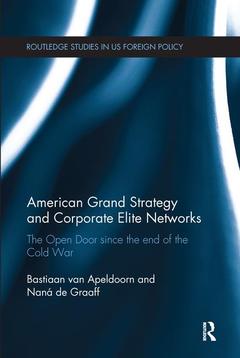Description
American Grand Strategy and Corporate Elite Networks
The Open Door since the End of the Cold War
Routledge Studies in US Foreign Policy Series
Authors: Van Apeldoorn Bastiaan, de Graaff Naná
Language: English
Subject for American Grand Strategy and Corporate Elite Networks:
Keywords
cold war; US Foreign Policy; Clinton; Bush; Obama; US Decline; Van Apeldoorn; Grand Strategy Makers; Policy Planning Network; postCold War; Ta Te; American Grand Strategy; Policy Planning Bodies; Corporate Elite Network; NATO Expansion; Global Open Door; Te Ch; America’s Corporate Elite; post-Cold War Grand Strategy; Grand Strategy Formation; Policy Planning Affiliations; State Capital Nexus; Van Der Pijl; Liberal World Order; Po Ra; Neoclassical Realism; NSS; Critical Political Economy Perspective; Grand Strategy; Open Door Imperialism; America’s Hegemonic Position
47.64 €
In Print (Delivery period: 14 days).
Add to cartPublication date: 12-2016
· 15.6x23.4 cm · Paperback
184.47 €
In Print (Delivery period: 14 days).
Add to cartPublication date: 10-2015
· 15.6x23.4 cm · Hardback
Description
/li>Contents
/li>Biography
/li>
This book presents a novel analysis of how US grand strategy has evolved from the end of the Cold War to the present, offering an integrated analysis of both continuity and change. The post-Cold War American grand strategy has continued to be oriented to securing an ?open door? to US capital around the globe. This book will show that the three different administrations that have been in office in the post-Cold War era have pursued this goal with varying means: from Clinton?s promotion of neoliberal globalization to Bush?s ?war on terror? and Obama?s search to maintain US primacy in the face of a declining economy and a rising Asia.
In seeking to make sense of both these strong continuities and these significant variations the book takes as its point of departure the social sources of grand strategy (making), with the aim to relate state (public) power to social (private) power. While developing its own theoretical framework to make sense of the evolution of US grand strategy, it offers a rich and rigorous empirical analysis based on extensive primary data that have been collected over the past years. It draws on a unique data-set that consists of extensive biographical data of 30 cabinet members and other senior foreign policy officials of each of the past three administrations of Clinton, G.W. Bush and Obama.
This book is of great use to specialists in International Relations ? within International Political Economy, International Security and Foreign Policy Analysis, as well as students of US Politics.
Introduction1.The Social Sources of American Grand Strategy The Puzzle of Continuity and Change in U.S. Grand Strategy. The Contribution from Elite Studies and Class Analysis. A Critical Political Economy Approach to Grand Strategy Analysis 2.Three Waves of Non-territorial Expansionism: American Grand Strategy from the Civil War to the Cold War Capitalist Expansionism and Expansionist Foreign Policy. From Territorial Expansionism to the First Wave of Open Door Imperialism. The Second Wave: The Great Depression and the Pax Americana. The Third Wave: The 1970s Crisis and U.S.-Centered Neoliberal Globalization. The Ends and Means of Open Door Imperialism 3.America’s Post- Cold War Grand-Strategy Makers and Corporate Elite Networks The Role of Corporate Elite Networks in Grand Strategy Formations. Analyzing Social Networks of Grand-strategy Makers: Data and Method. Governmental Career Paths of post-Cold War Grand-strategy Makers. Corporate Affiliations of the Clinton, Bush and Obama Administrations. The Shared Policy-Planning Network. Conclusion 4.American Grand Strategy after the Cold War: Clinton’s Grand Strategy Makers and Neoliberal Globalization Clinton’s Grand-strategy Makers. The Global Context: The End of the Cold War as an Opportunity for Expansionism. The Open Door Worldview under Clinton : Expansionism under the Banner of Globalization. A Grand Strategy of Neoliberal Globalization: Financial Markets, Free Trade and Airstrikes. Conclusion 5. American Grand Strategy after September 11: Bush’s Grand-Strategy Makers and the Neoconservative Shift Bush’s Grand-Strategy Makers. The Neoconservative Response to a "Squandered Decade": Context and Discourse. The Open Door Worldview under Bush: The Neoconservative Shift. A Neoconservative Grand Strategy: The War on Terror, Regime Change and Unyielding Neoliberalism. Conclusion 6.American Grand Strategy after the Global Financial Crisis: Obama’s Grand Strategy-Makers and Imperial Restoration Obama’s Grand-Strategy Makers. The Global Context: Eroding Legitimacy, Power Shifts and the Financial Crisis. The Open Door Worldview under Obama: Renewing American Leadership. A Grand Strategy of Imperial Restoration: Maintaining the Open Door from the Asia Pivot to the Drone Wars. Conclusion Conclusion
Bastiaan van Apeldoorn is Associate Professor of International Relations at the VU University Amsterdam.
Naná de Graaff is Assistant Professor in International Relations at the Department of Political Science, at VU University in Amsterdam, the Netherlands.




